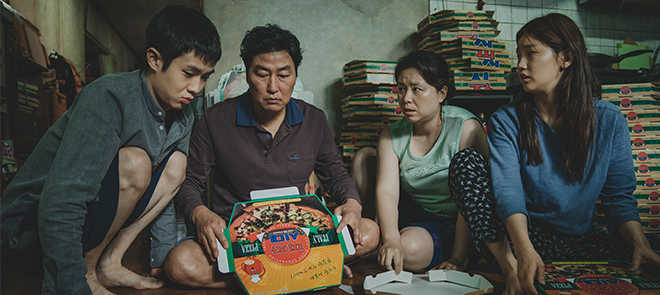Film In Review: Parasite
Published February 17, 2020


FILM IN REVIEW: Parasite
We are pleased to introduce our new resident film writer, Jim Norman, who will be bringing you insightful previews of upcoming films at Studio 74. Alongside his existing blog, On Film, these new articles will delve into the programme of our independent cinema to offer new perspectives.
Parasite proves that great cinema is not reliant on language, and that a master at work is exceptional regardless of subtitles. Writer/director Bong Joon-Ho has created an intermingling satire that intrinsically weaves character, theme and plot into a product of such poignancy and beauty that it is putting the seemingly derogatory title of ‘an international picture’ to shame.
I went into this film having avoided all trailers and synopses, and I can honestly say that this lack of insight makes for the best viewing experience. In its most basic form, the film follows an unemployed family who become increasingly interested in a rich yet naïve family, and work to become involved in their daily lives.
“Dripping in a comical cultural relevance”
Themes of capitalism and class boundaries cast a satirical shadow over the entire picture, allowing it to blossom into an excellently orchestrated masterpiece. It pays tribute to Hitchcock and Kubrick in its setting and slowly unravelling plot; its visuals are pleasingly in the perfectionist realm of Wes Anderson without ever becoming tiresome; its dialogue and development is dripping in a comical cultural relevance which reminded me of the work of Jordan Peele and Inside Number 9 at its best. It is, to put it simply, brilliant at everything that it does.

One need only take a glance at the film’s IMDB page to imagine the strain that the writer in charge of designating Parasite its genre classification must have been under. The website settles for ‘Comedy, Crime, Drama’, whilst others have turned to ‘Black Comedy’ and ‘Thriller’. The best part is that all of the above are correct.
Bong Joon-Ho’s playful experimentation with genre ensures that every twist and turn, of which there are many, is just as unexpected as the last. I laughed, I was shocked, I was amazed. Parasite takes all that you thought you knew about cinema and rewrites it to create a world in which the poor feed off the rich and sending a text message is the equivalent of holding a hostage.
“Every twist and turn, of which there are many, is just as unexpected as the last”
The phrase, ‘this is so metaphorical’, is recurrent throughout the picture, a nudging reminder of the filmmaker’s agency to tell a story that has bite. It is a satire which exposes and enforces questions of class through precise detailing and poetic imagery. Levels play an important role in the film’s navigation of this topic – with the ascension or descension of stairs playing so intrinsically into the portraits of each character. Song Kang-Ho’s performance as the struggling father, Kim Ki-taek, only serves to push this message further, with the frequent collaborator of Bong showing a fragility and self-consciousness that is rarely seen in similar figures.

Parasite impresses with both its clear references and its innate originality. It is blocked as if it were a stage play but put together in a manner that is wholly cinematic and exemplifies a master director at his best. It interweaves family and class war with a refreshing uniqueness that forces us to question, when everyone is feeding off of everyone else, who is the real parasite?
Parasite heads to Exeter Phoenix’s solar-powered cinema Studio 74 from Fri 28 Feb. Find out more about the film and pick up tickets here >>
